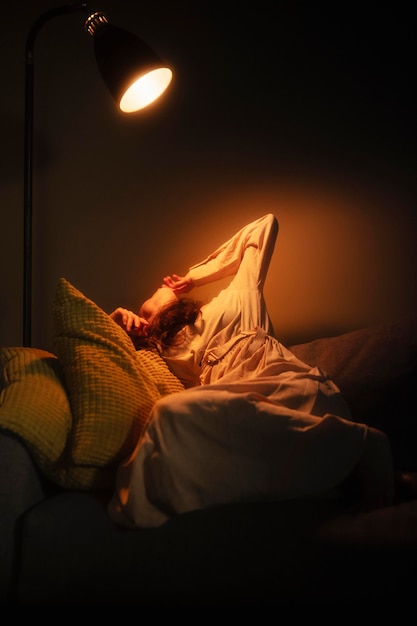Is Your Sleep Schedule Wrecking Your Health? Expert Sleep Tips for 2025

Is your sleep schedule sabotaging your health? In 2025, optimizing your sleep is crucial for overall well-being; this article explores how irregular sleep patterns can negatively impact your health and provides practical expert tips for establishing a consistent and restorative sleep routine.
Are you feeling tired, even after a full night’s sleep? Your sleep schedule might be the culprit. Is Your Sleep Schedule Sabotaging Your Health? Expert Tips for Optimizing Sleep in 2025 will guide you to a better, healthier sleep routine.
Understanding the Impact of Irregular Sleep Patterns
Irregular sleep patterns can have significant consequences for your overall health. Disrupting your body’s natural sleep-wake cycle, known as the circadian rhythm, can lead to various health problems. Let’s delve into the specifics of how these patterns affect you.
The Circadian Rhythm and Its Importance
The circadian rhythm is a 24-hour internal clock that regulates sleep and wakefulness. When your sleep schedule is erratic, this clock gets thrown off, leading to several issues.
Health Consequences of Poor Sleep Schedules
Inconsistent sleep schedules can result in a range of physical and mental health problems. From weakened immunity to increased risk of chronic diseases, the impact is far-reaching.
- Weakened Immune System: Lack of sleep impairs your body’s ability to fight off infections.
- Increased Risk of Chronic Diseases: Irregular sleep can contribute to conditions like diabetes and heart disease.
- Mental Health Issues: Sleep disturbances are linked to anxiety, depression, and mood swings.
- Cognitive Impairment: Poor sleep affects memory, concentration, and decision-making abilities.

Ultimately, recognizing and addressing irregular sleep patterns is the first step toward improving your overall health and well-being.
Identifying the Culprits Behind Your Sleep Problems
Several factors can contribute to a messed-up sleep schedule. Identifying these factors is essential to taking corrective measures. Here are some common culprits that might be affecting your sleep.
Lifestyle Factors
Your daily habits play a significant role in determining your sleep quality. Factors such as diet, exercise, and screen time can all have an impact.
Environmental Factors
The environment in which you sleep is just as important. Noise, light, and temperature can all disrupt your sleep if not properly managed.
- Exposure to blue light from screens before bed
- Caffeine and alcohol consumption close to bedtime
- Inconsistent meal times
- Lack of physical activity
Environmental factors such as noise pollution, excessive light, and unstable temperature can make falling and staying asleep difficult. By identifying and addressing these culprits, you can create a better sleep environment and improve your sleep schedule.
Creating a Consistent Sleep Routine for 2025
Establishing a consistent sleep routine is crucial for improving your sleep quality and overall health. This involves setting regular bedtimes and wake-up times, even on weekends. Let’s explore some strategies to help you create and maintain a healthy sleep routine.
Setting a Regular Bedtime and Wake-Up Time
Training your body to sleep and wake at the same times each day helps regulate your circadian rhythm. Consistency is key to establishing a healthy sleep routine.
The Importance of a Relaxing Bedtime Routine
A relaxing bedtime routine signals to your body that it’s time to sleep. Activities like reading, taking a warm bath, or listening to calming music can prepare you for a good night’s rest.

By implementing these tips, you can create a consistent sleep routine that promotes better sleep and improves your overall well-being.
Leveraging Technology for Better Sleep
In 2025, technology offers numerous tools and resources to enhance your sleep. From sleep tracking apps to smart devices, here’s how you can use technology to your advantage.
Sleep Tracking Apps and Devices
Sleep tracking apps monitor your sleep patterns, providing insights into sleep duration, sleep stages, and sleep quality. This data can help you identify areas for improvement.
Smart Lighting and Sound Machines
Smart lighting can mimic natural light patterns, promoting relaxation and better sleep. Sound machines can mask disruptive noises, creating a more conducive sleep environment.
- Track your sleep duration and quality with wearable devices
- Use apps to monitor sleep stages (light, deep, REM)
- Experiment with white noise or nature sounds to block out disturbances
- Adjust smart lighting to gradually dim before bedtime
By leveraging technology wisely, you can gain valuable insights into your sleep patterns and make informed decisions to enhance your sleep quality.
The Role of Diet and Exercise in Sleep Optimization
What you eat and how active you are during the day can significantly impact आपका sleep quality. Making conscious choices about diet and exercise can greatly enhance आपका sleep schedule.
Foods to Promote Sleep
Certain foods contain nutrients that promote relaxation and sleep. Incorporating these foods into your diet can help improve your sleep quality.
The Impact of Exercise on Sleep
Regular physical activity can improve sleep, but timing is crucial. Exercising too close to bedtime can have the opposite effect.
- Include magnesium-rich foods like spinach and almonds.
- Drink chamomile tea.
- Avoid heavy meals close to bedtime.
- Aim for at least 30 minutes of moderate exercise daily.
- Avoid intense workouts close to bedtime.
Adopting a healthy lifestyle that includes a balanced diet and regular exercise can contribute significantly to improved sleep and overall well-being.
Seeking Professional Help When Needed
If sleep problems persist despite implementing lifestyle changes and optimizing your sleep environment, it may be time to seek professional help. Sleep disorders can have underlying causes that require medical intervention. Let’s explore when and how to seek the right support.
Recognizing Signs of a Sleep Disorder
Symptoms such as excessive daytime sleepiness, snoring, and difficulty falling or staying asleep may indicate a sleep disorder. Recognizing these signs can prompt you to seek timely medical advice.
Consulting a Sleep Specialist
A sleep specialist can conduct a thorough evaluation and recommend appropriate treatments, such as medications or therapies, to address your specific sleep issues.
- Persistent Insomnia
- Sleep Apnea
- Restless Legs Syndrome
- Narcolepsy
Seeking professional help when needed is crucial for identifying and addressing underlying sleep disorders, enabling you to achieve better sleep and improve your overall health.
| Key Point | Brief Description |
|---|---|
| ⏰ Sleep Schedule | Maintain a consistent bedtime and wake-up time. |
| 🌙 Bedtime Routine | Incorporate relaxing activities before bed. |
| 📱 Tech Use | Use sleep tracking apps and smart lighting. |
| 💪 Exercise | Engage in regular physical activity, but not before bed. |
Frequently Asked Questions (FAQ)
Irregular sleep patterns can disrupt your circadian rhythm, leading to weakened immunity, increased risk of chronic diseases, mental health issues, and cognitive impairment.
Lifestyle factors such as exposure to blue light from screens, caffeine and alcohol consumption, inconsistent meal times, and lack of physical activity can impact sleep.
Yes, sleep tracking apps and devices can monitor your sleep patterns, and smart lighting and sound machines can create a more conducive sleep environment.
Seek professional help if you experience persistent insomnia, sleep apnea, restless legs syndrome, or other signs of a sleep disorder despite lifestyle changes.
Conclusion
Prioritizing a consistent and optimized sleep schedule is paramount for your health and well-being in 2025. By understanding the impact of irregular sleep patterns, identifying the culprits behind your sleep problems, and implementing expert tips for improvement, you can achieve more restful nights and healthier, more productive days.
